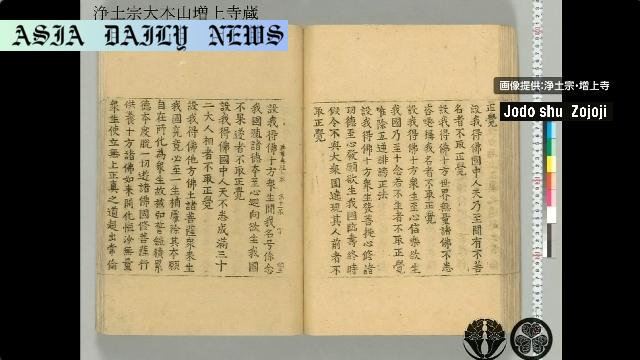UNESCO announces the inclusion of ancient Buddhist scriptures from Tokyo’s Zojoji temple to its prestigious Memory of the World list.

Introduction: UNESCO Recognizes Zojoji’s Buddhist Scriptures
UNESCO has officially recognized the ancient Buddhist scriptures housed in Tokyo’s Zojoji temple, adding them to its esteemed Memory of the World list. These historical texts, known as the ‘Three Editions of Buddhist Sacred Canons,’ symbolize global heritage and cultural richness. Originating from the 12th and 13th centuries, the scriptures consist of over 12,000 meticulously preserved woodblock prints. Their inclusion on UNESCO’s list underscores their invaluable role in advancing the global understanding of Buddhism, history, and linguistics.
The Significance of the Three Editions of Buddhist Sacred Canons
These scriptures have an extraordinary reputation among scholars and practitioners alike. Being woodblock prints, the texts are not only a pristine example of ancient craftsmanship but also a key medium through which Buddhist teachings were spread. Their influence laid the foundation for the academic study of Buddhism worldwide. Moreover, their rarity and diversity make them a treasure trove for linguists and historians, providing deep insights into cultural and religious practices from centuries ago. UNESCO’s recognition elevates their status, ensuring their preservation for future generations and reinforcing their importance in academic research.
How UNESCO’s Memory of the World Works
The Memory of the World initiative by UNESCO aims to safeguard documentary heritage of immense historical and cultural significance. Every two years, nations submit proposals to have their documents reviewed for inclusion. In 2023, the executive committee convened in Paris to decide on entries based on their historical impact, rarity, and global importance. Japan’s Three Editions of Buddhist Sacred Canons are now the ninth addition from the country to this globally revered list. However, not all applications are successful. For instance, efforts to secure recognition for Hiroshima-related materials did not pass the screening this year, indicating the high standards of selection and the competitive nature of the process.
The Impact of Recognition on Japan and Global Heritage
For Japan, the inclusion of the Zojoji scriptures strengthens its reputation as a nation preserving priceless artifacts of world heritage. This recognition highlights not only the cultural richness of the nation but also its commitment to safeguarding relics that played a pivotal role in shaping human civilization. By securing a spot on this list, Japan’s Ministry of Culture is encouraged to continue its efforts in heritage preservation and education. Globally, this act reiterates the importance of cross-cultural appreciation and an understanding of humanity’s shared history.
The Future of Hiroshima Materials and Japan’s Push for Inclusion
While the Zojoji scriptures succeeded in achieving recognition, Japan’s attempt to include photos and videos related to the Hiroshima atomic bombing faced setbacks. The Hiroshima materials, which were jointly submitted by the city of Hiroshima, NHK, and news organizations, did not pass UNESCO’s rigorous selection process for 2025. This has led to discussions among stakeholders about a resubmission. Despite the disappointment, Japan’s efforts highlight its dedication to preserving and sharing crucial moments of history with the world. The incident also serves as a learning opportunity for future applications, ensuring stronger submissions that align with UNESCO’s guidelines.
Conclusion: Celebrating Heritage While Aiming for More
The addition of Zojoji’s Buddhist scriptures to UNESCO’s Memory of the World list marks a moment of celebration for Japan and a step forward for global heritage preservation. This achievement underscores the cultural, historical, and academic value of ancient texts, inspiring nations to prioritize the protection of their heritage. Simultaneously, Japan’s ongoing commitment to submitting other materials, such as the Hiroshima artifacts, demonstrates its broader mission of contributing to the global cultural narrative. These efforts serve to remind humanity of the importance of preserving and cherishing its shared past.
Commentary
The Global Significance of Cultural Heritage Preservation
UNESCO’s decision to include the Zojoji temple’s ancient Buddhist scriptures in its Memory of the World list is more than a victory for Japan; it is a testament to the enduring importance of cultural preservation. The scriptures, which date back to the 12th and 13th centuries, serve as a window into the past, connecting us to the spiritual and academic legacies of ancient civilizations. This recognition reaffirms the notion that the preservation of cultural heritage is a shared responsibility, transcending national borders and emphasizing humanity’s interconnectedness.
A Catalyst for Awareness and Action
Such acknowledgments by UNESCO often act as catalysts for further action in the realm of heritage preservation. By bringing global attention to the Zojoji scriptures, UNESCO not only ensures their continued safety but also sparks a broader interest in other similar cultural artifacts. This newfound spotlight can encourage countries to invest more deeply in their archival resources and contribute to the global community by sharing their treasures. For Japan, this moment reinforces its commitment to preserving its rich history while inspiring other nations to do the same.
A Broader Conversation on Hiroshima’s Legacy and Challenges
While the Zojoji scriptures earned their well-deserved place, the exclusion of Hiroshima-related materials from UNESCO’s list highlights the complexity of the selection process. This decision provides an opportunity for stakeholders to carefully revisit their submission and strengthen it for resubmission. It is also a poignant reminder of the delicate balance between honoring past tragedies and adhering to UNESCO’s criteria. By addressing these challenges thoughtfully, Japan can continue to amplify the voices of history and contribute to the global dialogue about war and peace.
Final Thoughts
The recognition of the Zojoji scriptures by UNESCO resonates deeply with the idea of shared human culture. It is a reminder of how interconnected we are as a global society, and how artifacts from the past can shape our understanding of the present and the future. As nations strive to preserve their cultural legacies, such achievements inspire hope and unity, fostering a collective appreciation for what makes us human and urging us to protect it.


